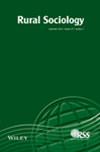农村批判理论:十年来对农村教育研究的影响》☆ 《农村批判理论:对农村教育研究的影响
IF 2.3
3区 社会学
Q2 SOCIOLOGY
引用次数: 0
摘要
长期以来,农村教育研究人员一直关注日益增长的城市化,以及随之而来的政策、文化和资本流动性的变化对农村人口和社区的影响,但他们的研究成果在很大程度上与研究城市和郊区人口的 "主流 "研究相去甚远。2011 年,《农村批判理论》一书出版:结构、空间、文化》一书出版后,学者们获得了一种新的理论工具,用于探究场所营造、身份形成、课程设计和政策实施的过程。本文介绍了该理论在幼儿园-12 年级和高等教育研究中应用的关键要素,并关注了当前文献中的空白以及未来理论阐述的方向。重点领域包括批判性农村理论在 K-12 课程和政策研究中的应用,以及在高等教育背景下对社区资本、大学过渡和交叉身份的研究。本文章由计算机程序翻译,如有差异,请以英文原文为准。
Critical Rural Theory: A Decade of Influence on Rural Education Research☆
Rural education researchers have long been interested in the impact of increasing urbanization, with its attendant shifts in policy, culture, and capital mobility, on rural people and communities, but their findings have existed largely to the side of “mainstream” research examining urban and suburban populations. With the publication in 2011 of Critical Rural Theory: Structure, Space, Culture , scholars acquired a new theoretical tool for inquiring into processes of place‐making, identity formation, curricular design, and policy implementation. This article establishes key elements of the theory as they have been applied in both K‐12 and higher education research, giving attention to current gaps in the literature as well as future directions for theoretical elaboration. Essential areas of focus include critical rural theory's applications in K‐12 curricula and policy studies as well as research on community capitals, college transitions, and intersectional identity in higher education contexts.
求助全文
通过发布文献求助,成功后即可免费获取论文全文。
去求助
来源期刊

RURAL SOCIOLOGY
SOCIOLOGY-
CiteScore
4.60
自引率
13.00%
发文量
47
期刊介绍:
A forum for cutting-edge research, Rural Sociology explores sociological and interdisciplinary approaches to emerging social issues and new approaches to recurring social issues affecting rural people and places. The journal is particularly interested in advancing sociological theory and welcomes the use of a wide range of social science methodologies. Manuscripts that use a sociological perspective to address the effects of local and global systems on rural people and places, rural community revitalization, rural demographic changes, rural poverty, natural resource allocations, the environment, food and agricultural systems, and related topics from all regions of the world are welcome. Rural Sociology also accepts papers that significantly advance the measurement of key sociological concepts or provide well-documented critical analysis of one or more theories as these measures and analyses are related to rural sociology.
 求助内容:
求助内容: 应助结果提醒方式:
应助结果提醒方式:


